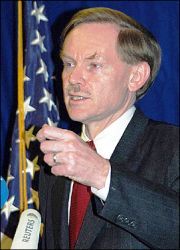Hope in Abuja talks for ending Darfur crisis — US’s Zoellick
Sept 29, 2005 (WASHINGTON) — Ending violence in Sudan’s Darfur region is in the hands of negotiators for rebel factions and the Sudanese government who are now meeting in Abuja, Nigeria, Deputy Secretary of State Robert Zoellick told a Senate hearing September 28.
 Zoellick, who recently visited Darfur and other parts of Sudan, told the Senate Foreign Relations Committee that African Union-sponsored peace talks between the government of Sudan and Darfur rebels have made modest progress since they began earlier this year in Nigeria.
Zoellick, who recently visited Darfur and other parts of Sudan, told the Senate Foreign Relations Committee that African Union-sponsored peace talks between the government of Sudan and Darfur rebels have made modest progress since they began earlier this year in Nigeria.
The number two official at the State Department told Committee Chairman Richard Lugar (Republican of Indiana) that he hoped the talks – which resumed in Abuja September 16 — would provide a lasting solution to the crisis in Darfur, which has displaced up to 2 million people, including 200,000 living in 12 refugee camps in neighboring Chad.
Even though the signing of a Comprehensive Peace Agreement (CPA) in January between the Khartoum government and the Sudan People’s Liberation Movement (SPLM) brought the 20-year-long North-South conflict under control, rebel factions in Darfur, such as the Sudan Liberation Army (SLA) and the Justice and Equity Movement (JEM), still are battling it out — with each other and with Sudanese government-backed militias called Jingaweit — while negotiations continue in Abuja.
Zoellick told the lawmakers that although “large-scale organized violence has substantially subsided,” with the Sudanese military having “pulled back” from Darfur, “Janjaweed and other militias have not been disbanded and continue to contribute to the violence.” SLA/JEM rebels also have been active, he said, “attacking humanitarian convoys and fighting over livestock.”
In July, parties at the Abuja talks, facilitated by former Organization of African Unity (OAU) Secretary-General Salim Ahmed Salim, were able finally to agree to a declaration of principles, now used as a framework for further negotiations.
Pointing out that “there are no angels in this part of the world,” Zoellick told the senators that a recent uptick of violence in Darfur might “possibly [be the parties] positioning for negotiations” in Abuja. And he said “a message” he wanted to convey strongly was that such a strategy would not be tolerated by the United States and definitely would be counterproductive.
Zoellick said the goal of U.S. aid, amounting to $1.9 billion since 2003, and U.S. military support, mainly airlifts for an AU security force that soon will number 7,700, is “to create a secure environment and political [and] tribal reconciliation so people can voluntarily return home safely, beginning in the first half of 2006”; about the time it is hoped the Abuja talks will have a successful conclusion.
“The CPA creates a political and constitutional framework for sharing authority and [oil] wealth within which to end the conflicts in Darfur and other regions,” he declared, adding that Assistant Secretary of State for African Affairs Jendayi Frazer would “be going out [to Sudan] in a few weeks to meet with the new [national unity] government.”
SENATORS RESPOND
Lugar said, “Even as we focus on Darfur, we must be cognizant that simmering disputes in the East [of Sudan] and the South remain a threat to the Comprehensive Peace Agreement.”
Senator Joseph Biden (Democrat of Delaware) said he hoped progress would continue in Darfur because “with so many problems here at home — after [hurricanes] Katrina and Rita, not to mention Iraq — the American people understandably may want us to refocus our efforts and our resources.”
(Washington File /ST)
